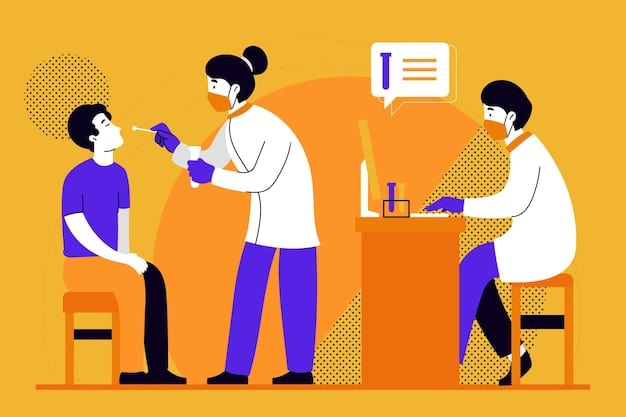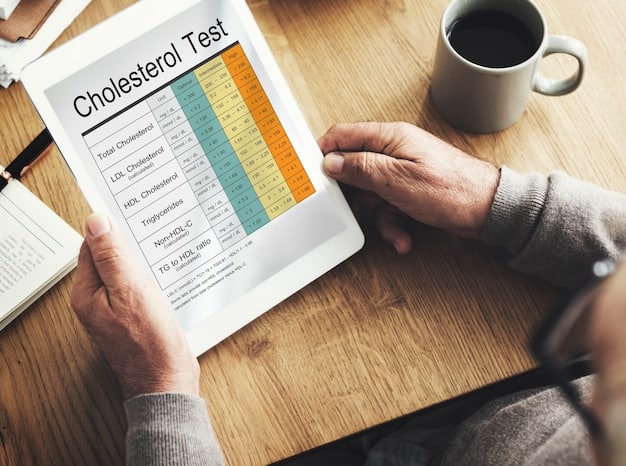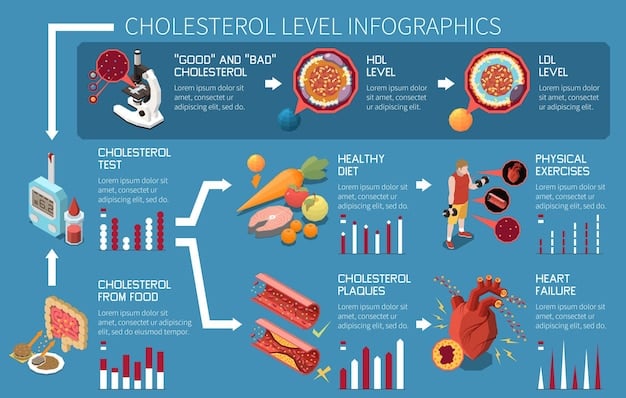Updated Guidelines: Cholesterol Testing in 2025 for Optimal Health

Updated Guidelines: What You Need to Know About Cholesterol Testing in 2025 emphasize personalized risk assessment and lifestyle interventions to optimize heart health. These guidelines provide a comprehensive approach, ensuring individuals receive tailored recommendations for managing their cholesterol levels effectively.
Understanding your cholesterol levels is a key aspect of maintaining good health, especially when it comes to preventing heart disease. As we approach 2025, it’s essential to stay informed about the latest recommendations and advancements in cholesterol testing.
The Updated Guidelines: What You Need to Know About Cholesterol Testing in 2025 are designed to provide individuals and healthcare professionals with the most current information on assessing and managing cholesterol for better cardiovascular outcomes. Let’s explore what these guidelines entail and how they can impact your health.
Understanding the Importance of Cholesterol Testing
Cholesterol testing plays a vital role in assessing an individual’s risk of developing heart disease. Regular monitoring helps healthcare providers identify elevated levels of LDL cholesterol (often referred to as “bad” cholesterol) and low levels of HDL cholesterol (the “good” cholesterol). The goal is early detection and proactive management.
Why is Cholesterol Testing Important?
Testing is more than just measuring numbers; it’s about understanding your risk and taking preventive measures. Here’s why it’s so vital:
- Early Detection: Identifies potential heart-related issues early on.
- Risk Assessment: Helps determine your risk for heart disease and stroke.
- Personalized Treatment: Guides healthcare providers in creating tailored treatment plans.
Without regular cholesterol testing, individuals may unknowingly be at risk. Adopting the **Updated Guidelines: What You Need to Know About Cholesterol Testing in 2025** can lead to informed choices and better health outcomes.

By continually improving our approach to cholesterol testing, we can enhance our ability to prevent and manage heart disease. The **Updated Guidelines: What You Need to Know About Cholesterol Testing in 2025** reflect these advances, underlining the need for ongoing vigilance and informed decision-making.
Key Changes in the 2025 Cholesterol Testing Guidelines
The **Updated Guidelines: What You Need to Know About Cholesterol Testing in 2025** include several significant changes aimed at improving the accuracy and effectiveness of cholesterol management. These refinements ensure that healthcare providers have the most up-to-date recommendations at their fingertips.
Personalized Risk Assessment
One of the key updates focuses on personalized risk assessment. Rather than relying solely on LDL cholesterol levels, the updated guidelines recommend a comprehensive evaluation incorporating multiple factors, such as:
- Family History: A thorough review of family history of heart disease.
- Lifestyle Factors: Consideration of diet, exercise, and smoking habits.
- Presence of Other Conditions: Assessment for diabetes, high blood pressure, and other relevant health issues.
This holistic approach ensures more accurate risk stratification and tailored treatment plans. Keeping up with the **Updated Guidelines: What You Need to Know About Cholesterol Testing in 2025** is vital for healthcare professionals to provide superior patient care.
Understanding these changes allows for a more proactive and effective approach to cholesterol management. By prioritizing personalized risk assessment, the **Updated Guidelines: What You Need to Know About Cholesterol Testing in 2025** aim to reduce the burden of heart disease and improve overall health outcomes.
Understanding LDL and HDL Cholesterol
Understanding the difference between LDL (low-density lipoprotein) and HDL (high-density lipoprotein) cholesterol is crucial in interpreting your cholesterol test results. Each plays a distinct role in your body, and their levels can significantly impact your heart health.
LDL Cholesterol: The “Bad” Cholesterol
LDL cholesterol is often referred to as “bad” cholesterol because high levels can lead to plaque buildup in your arteries. This plaque narrows the arteries, increasing the risk of heart attack and stroke. The **Updated Guidelines: What You Need to Know About Cholesterol Testing in 2025** emphasize the importance of keeping LDL levels in check through lifestyle changes and, if necessary, medication.
HDL Cholesterol: The “Good” Cholesterol
HDL cholesterol, on the other hand, is known as “good” cholesterol. It helps remove LDL cholesterol from the arteries, transporting it back to the liver for elimination. Higher levels of HDL cholesterol are associated with a lower risk of heart disease. The **Updated Guidelines: What You Need to Know About Cholesterol Testing in 2025** encourage lifestyle strategies to boost HDL levels.

Knowing your LDL and HDL levels is just the first step. Understanding what these levels mean and how to manage them is essential for maintaining good heart health. The **Updated Guidelines: What You Need to Know About Cholesterol Testing in 2025** aim to empower individuals with this knowledge.
Lifestyle Changes to Improve Cholesterol Levels
Making lifestyle changes can significantly impact your cholesterol levels. Adopting healthy habits can often reduce your risk of heart disease and improve your overall well-being. Lifestyle modifications are a cornerstone of the **Updated Guidelines: What You Need to Know About Cholesterol Testing in 2025**.
Dietary Modifications
One of the most effective ways to improve cholesterol levels is through dietary changes. Consider these strategies:
- Reduce Saturated and Trans Fats: Limit foods high in saturated fats (e.g., red meat, full-fat dairy) and avoid trans fats (often found in processed foods).
- Increase Soluble Fiber: Consume plenty of fruits, vegetables, oats, and legumes.
- Include Healthy Fats: Incorporate sources of monounsaturated and polyunsaturated fats, such as olive oil, avocados, and nuts.
These dietary changes can help lower LDL cholesterol and raise HDL cholesterol. Tailoring your diet to meet the recommendations in the **Updated Guidelines: What You Need to Know About Cholesterol Testing in 2025** can support better heart health.
By prioritizing these lifestyle changes, you can take proactive steps toward improving your cholesterol levels and reducing your risk of heart disease. Staying informed about the **Updated Guidelines: What You Need to Know About Cholesterol Testing in 2025** helps you make the best choices for your health.
The Role of Medications in Cholesterol Management
In some cases, lifestyle changes alone may not be sufficient to manage high cholesterol. Medications, such as statins, can play a crucial role in lowering LDL cholesterol levels. The **Updated Guidelines: What You Need to Know About Cholesterol Testing in 2025** provide detailed recommendations on when and how to use these medications.
Understanding Statins
Statins are a class of drugs that help reduce LDL cholesterol by blocking an enzyme in the liver that produces cholesterol. They are among the most commonly prescribed medications for managing high cholesterol. However, it’s essential to understand their potential side effects and how they interact with other medications.
The need for medication always depends on an individual’s overall risk profile, including factors such as age, family history, and the presence of other medical conditions. Following the **Updated Guidelines: What You Need to Know About Cholesterol Testing in 2025** helps healthcare providers make informed decisions about the use of cholesterol-lowering medications.
Future Trends in Cholesterol Testing
The field of cholesterol testing is continually evolving, with ongoing research leading to new methods and technologies. The **Updated Guidelines: What You Need to Know About Cholesterol Testing in 2025** also consider potential future trends that could further enhance cholesterol management.
Advanced Lipid Testing
Advanced lipid testing goes beyond standard cholesterol panels to provide a more detailed analysis of lipid particles. This can include measuring the size and density of LDL particles, as well as assessing other lipid markers that may influence heart disease risk. The **Updated Guidelines: What You Need to Know About Cholesterol Testing in 2025** acknowledge the potential value of these tests in certain situations.
- Lp(a) Testing: Measuring Lipoprotein(a) can identify genetically elevated risk.
- NMR Lipoprofile: Nuclear Magnetic Resonance provides detailed lipoprotein subclass analysis.
- Genetic Testing: Identifying genetic predispositions to high cholesterol.
Staying abreast of these developments ensures that individuals receive the most effective and personalized care. The **Updated Guidelines: What You Need to Know About Cholesterol Testing in 2025** emphasize the importance of adopting innovative approaches to improve heart health outcomes.
| Key Point | Brief Description |
|---|---|
| 🩺 Regular Testing | Monitor cholesterol regularly to manage heart health effectively. |
| 🥗 Lifestyle Changes | Improve cholesterol via diet and exercise. |
| 💊 Medications | Use statins to lower LDL levels. |
| 🧬 Genetic Factors | Consider family history for personalized risk assessment. |
Frequently Asked Questions
The frequency of cholesterol testing varies depending on your age, risk factors, and medical history. Generally, adults should have their cholesterol checked every 4-6 years but more regular testing informed by the **Updated Guidelines: What You Need to Know About Cholesterol Testing in 2025** may be appropriate.
A healthy cholesterol level varies from person to person but is generally considered to be an LDL cholesterol level below 100 mg/dL, an HDL cholesterol level above 60 mg/dL, and total cholesterol below 200 mg/dL.
Yes, diet can play a significant role in lowering cholesterol levels. A diet low in saturated and trans fats, high in soluble fiber, and rich in healthy fats can help lower LDL cholesterol and raise HDL cholesterol, in line with the **Updated Guidelines: What You Need to Know About Cholesterol Testing in 2025**.
Yes, statin medications can have side effects, including muscle pain, liver damage, and increased blood sugar levels. It’s essential to discuss potential side effects with your healthcare provider.
The updated guidelines emphasize a comprehensive approach to personalized risk assessment, incorporating factors such as family history, lifestyle, and other health conditions. This holistic evaluation allows for better risk stratification and tailored treatment plans as outlined by the **Updated Guidelines: What You Need to Know About Cholesterol Testing in 2025**.
Conclusion
Staying informed about the **Updated Guidelines: What You Need to Know About Cholesterol Testing in 2025** is crucial for proactively managing your heart health. Regular cholesterol testing, combined with lifestyle changes and, when necessary, medication, can significantly reduce your risk of heart disease.





